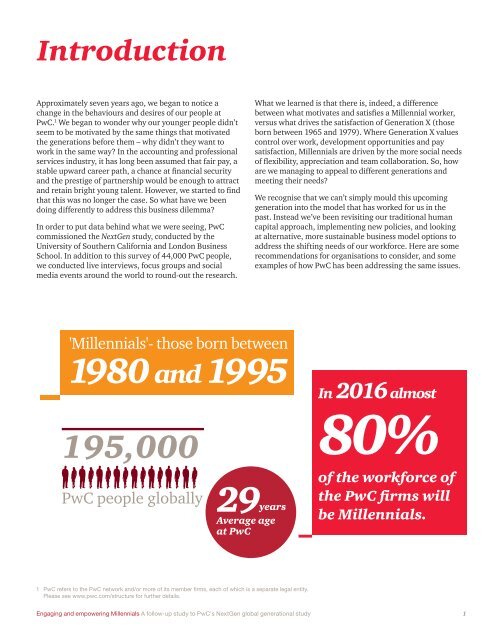pwc-engaging-and-empowering-millennials
Create successful ePaper yourself
Turn your PDF publications into a flip-book with our unique Google optimized e-Paper software.
Introduction<br />
Approximately seven years ago, we began to notice a<br />
change in the behaviours <strong>and</strong> desires of our people at<br />
PwC. 1 We began to wonder why our younger people didn’t<br />
seem to be motivated by the same things that motivated<br />
the generations before them – why didn’t they want to<br />
work in the same way? In the accounting <strong>and</strong> professional<br />
services industry, it has long been assumed that fair pay, a<br />
stable upward career path, a chance at financial security<br />
<strong>and</strong> the prestige of partnership would be enough to attract<br />
<strong>and</strong> retain bright young talent. However, we started to find<br />
that this was no longer the case. So what have we been<br />
doing differently to address this business dilemma?<br />
In order to put data behind what we were seeing, PwC<br />
commissioned the NextGen study, conducted by the<br />
University of Southern California <strong>and</strong> London Business<br />
School. In addition to this survey of 44,000 PwC people,<br />
we conducted live interviews, focus groups <strong>and</strong> social<br />
media events around the world to round-out the research.<br />
What we learned is that there is, indeed, a difference<br />
between what motivates <strong>and</strong> satisfies a Millennial worker,<br />
versus what drives the satisfaction of Generation X (those<br />
born between 1965 <strong>and</strong> 1979). Where Generation X values<br />
control over work, development opportunities <strong>and</strong> pay<br />
satisfaction, Millennials are driven by the more social needs<br />
of flexibility, appreciation <strong>and</strong> team collaboration. So, how<br />
are we managing to appeal to different generations <strong>and</strong><br />
meeting their needs?<br />
We recognise that we can’t simply mould this upcoming<br />
generation into the model that has worked for us in the<br />
past. Instead we’ve been revisiting our traditional human<br />
capital approach, implementing new policies, <strong>and</strong> looking<br />
at alternative, more sustainable business model options to<br />
address the shifting needs of our workforce. Here are some<br />
recommendations for organisations to consider, <strong>and</strong> some<br />
examples of how PwC has been addressing the same issues.<br />
'Millennials'- those born between<br />
1980 <strong>and</strong> 1995<br />
195,000<br />
In 2016 almost<br />
80%<br />
PwC people globally<br />
29<br />
years<br />
Average age<br />
at PwC<br />
of the workforce of<br />
the PwC firms will<br />
be Millennials.<br />
1 PwC refers to the PwC network <strong>and</strong>/or more of its member firms, each of which is a separate legal entity.<br />
Please see www.<strong>pwc</strong>.com/structure for further details.<br />
Engaging <strong>and</strong> <strong>empowering</strong> Millennials A follow-up study to PwC's NextGen global generational study 1


